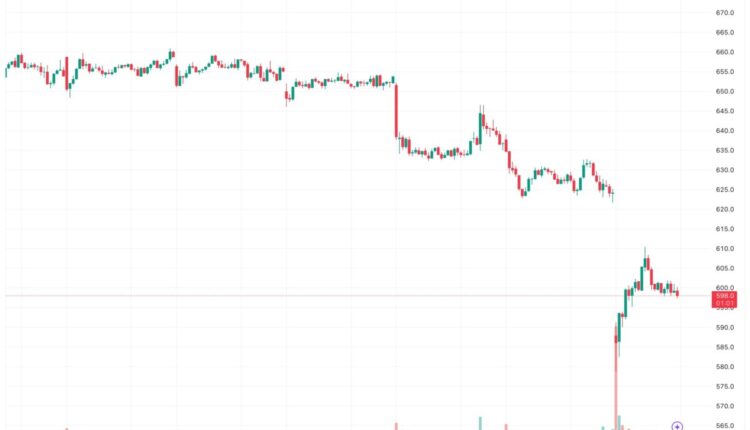Goldman Sachs leads 27% rise as Investment Banking Fees Surge
The biggest banks on Wall Street, including Goldman Sachs, had a big upswing in the third quarter as corporate clients picked up loans and increased mergers. Two years of inactivity went by before the present quarter and now the latest earnings reports are pointing out the high investment banking fees and good performance of the trading desks.
Though the same period of the previous year was used for comparison, Goldman Sachs (GS) showed a 20% increase in investment banking fees, which was their performance uptick. Bank of America (BAC) and Citigroup (C) also got decent gains. Investment banking is that sector that has been doing its best since the Federal Reserve made the decision to start the interest rate cuts.
The talks that Goldman Sachs CEO David Solomon engaged in also touched on interest rates. The client finally got to the point where he was about to confide the good news to his clients, who felt very secure and were reassured of their imminent mergers and acquisitions (M&A) and other business activities. In the interim, executives of both Bank of America and Citigroup seconded the motion, pointing out the increase in investment banking revenues and favourable market conditions.
Wall Street Banks See 27% Surge in Q3
The last quarter of 2024 witnessed a recovery in investment banking, which had been in bad shape due to the economic situation of instability and high loan costs. Goldman Sachs’s investment banking revenue rose by $1.8 billion, a 20% increase compared to the previous year, driven by new debt and equity issues and M&A activity.
Not only Bank of America, but Citigroup also was able to win which should be Bank of America’s clear explanation of their year-over-year gains from investment banking and asset management fees. The bank’s investment banking revenues jumped by 16% for debt issuance and 37% for equity issuance, severally.
Citigroup also witnessed the positive influence of the rising M&A operations, which managed to take the sting out of a marginal profit decrease linked to the prior year.
Combined, the four major Wall Street banks — Goldman Sachs, Bank of America, Citigroup, and JPMorgan Chase — brought in a whopping $6.5 billion in investment banking fees during Q3, which is a 27% increase from a year ago.
Nonetheless, there are still some trials. The international state, particularly in the Middle East, and the lack of clarity around the forthcoming 2024 US presidential election could produce varying market sentiment and decelerate this uptrend.
Bank of America and Citigroup Face Mixed Results
Together with success in the investment banking sector and excellently performing in trading and wealth management, Goldman Sachs and the banks in competition attained good results in these sectors. The growth of market shares was largely owing to a 2% increase in equity trading, which was the major single driver of the total trading revenues. The company’s assets and wealth management department also posted 16% revenue growth, again showing its dominance in these fields.
Above expectations, Bank of America grew revenue trading-wise, having a 12% increase in trading revenue. Technology contributed to the increase in trading revenue for Citibank. Being successful in trading equity, an investment bank like Goldman Sachs faced some problems in its fixed-income division.
The bad side of things was that Bank of America and Citigroup were both reporting poor consumer banking results which caused damage to their overall profits. On the other hand, Citigroup’s net income declined from $3.5 billion to $3.2 billion a year earlier due to the underperformance in certain key areas, among which were bond trading and returns on equity.
Even though Goldman Sachs’ stock had outperformed the other main banks’, the firm still had some headwinds. Goldman Sachs advances in 2024 with strong investment banking results and the firm’s competitive position in trading and wealth management.
GS Lowers LVMH Price Target to €770
Goldman Sachs dropped its target price for LVMH to €770 from €815 due to the luxury retailer’s weaker Q3 sales figures. Notwithstanding sticking to a “Buy” rating, the change was made a week after LVMH showed a 3% fall in cFX, which was less than the market expected.
LVMH/USD 15 Minute Chart
The company’s organic sales also stagnated by 3% year over year, aside from the predictions for a meagre increase. LVMH’s Fashion and Leather Division, its largest sector, registered a 5.0% gain in cFX, while the Wines & Spirits sector dropped by 7% worse than planned. Hennessy stood out in the US following a pick-up in a trade that saw inventory levels return to normalcy.
Looking ahead to the future, the most recent earnings reports from banks indicate a slow but positive economic environment. A decisive action by the Federal Reserve, which was responsible for the reduction of the interest rate with 50 basis points in September, has sparked a hope of “a gentle descent” on the part of the US economy, and as a result, Goldman Sachs chief David Solomon reported that the initiation of the rate cut has had the effect of cheering up corporate clients.
Learn how the economic changes are going to affect you, whether you are an investor, a company manager, or an individual who is interested in how the cuts in the interest rate will be felt on the market. Also, stay with us and read more discussions and surveys on prominent directions of the banking industry!
The post Goldman Sachs Leads 27% Surge in Banking Fees appeared first on FinanceBrokerage.

